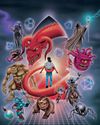
THE FIRST THING you're likely to read about the Metropolitan Museum of Art's new exhibition dedicated to the Harlem Renaissance is that it's a long-overdue atonement for past sins. Specifically, 1969's "Harlem on My Mind," the museum's first survey of African American culture, which included photographs of Black people and no other art at all-as if the people themselves were curiosities on display. Denise Murrell, curator of "The Harlem Renaissance and Transatlantic Modernism," is keenly aware of the "stupefying, clueless racism" of that earlier fiasco, as she told the New York Times. Boasting more than 150 paintings, sculptures, and photographs by mostly Black artists, the current show dances on the old show's grave.
But there is more going on here than a mere righting of historical wrongs. The clue is in the second half of the show's name"Transatlantic Modernism"-which gestures at the scope of its ambition. The Harlem Renaissance largely took place in the 1920s and '30s, just when modernism was reaching the zenith of its influence across art, literature, and music. Yet these two periods of heady artistic activity have been walled off from each other in the collective memory, the Black portion of the story having gone mostly ignored. The Met's show about Harlem suggests that we have gotten modernism-the big bang of 20th-century art-all wrong and that it was wilder and even more radical than we had known.
This story is from the February 26 - March 10, 2024 edition of New York magazine.
Start your 7-day Magzter GOLD free trial to access thousands of curated premium stories, and 9,000+ magazines and newspapers.
Already a subscriber ? Sign In
This story is from the February 26 - March 10, 2024 edition of New York magazine.
Start your 7-day Magzter GOLD free trial to access thousands of curated premium stories, and 9,000+ magazines and newspapers.
Already a subscriber? Sign In

LIFE AS A MILLENNIAL STAGE MOM
A journey into the CUTTHROAT and ADORABLE world of professional CHILD ACTORS.

THE NEXT DRUG EPIDEMIC IS BLUE RASPBERRY FLAVORED
When the Amor brothers started selling tanks of flavored nitrous oxide at their chain of head shops, they didn't realize their brand would become synonymous with the country's burgeoning addiction to gas.

Two Texans in Williamsburg
David Nuss and Sarah Martin-Nuss tried to decorate their house on their own— until they realized they needed help: Like, how do we not just go to Pottery Barn?”

ADRIEN BRODY FOUND THE PART
The Brutalist is the best, most personal work he's done since The Pianist.

Art, Basil
Manuela is a farm-to-table gallery for hungry collectors.

'Sometimes a Single Word Is Enough to Open a Door'
How George C. Wolfein collaboration with Audra McDonald-subtly, indelibly reimagined musical theater's most domineering stage mother.

Rolling the Dice on Bird Flu
Denial, resilience, déjà vu.

The Most Dangerous Game
Fifty years on, Dungeons & Dragons has only grown more popular. But it continues to be misunderstood.

88 MINUTES WITH...Andy Kim
The new senator from New Jersey has vowed to shake up the political Establishment, a difficult task in Trump's Washington.

Apex Stomps In
The $44.6 million mega-Stegosaurus goes on view (for a while) at the American Museum of Natural History.